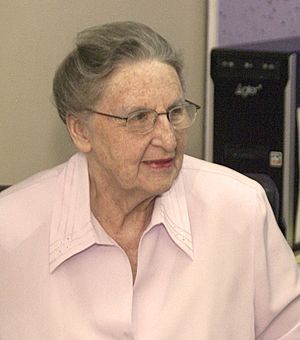Jurate Rosales facts for kids
Quick facts for kids
Jūratė Regina Statkutė de Rosales
|
|
|---|---|
 |
|
| Born |
Jūratė Regina Statkutė
9 September 1929 Kaunas, Lithuania
|
| Died | 4 September 2023 (aged 93) Caracas, Venezuela
|
| Nationality | Lithuanian |
| Occupation | Teacher, journalist |
Jūratė Regina Statkutė de Rosales (born September 9, 1929 – died September 4, 2023) was a journalist and historian. She was born in Lithuania and later lived in Venezuela. She wrote books and articles suggesting that the Goths, an ancient group of people, were actually from the Baltic region, not Germany.
Early Life and Education
Jūratė Regina Statkutė de Rosales was born on September 9, 1929, in Kaunas, Lithuania. She lived with her parents, sometimes in Paris, until 1938. Her father, Jonas Statkus, was a high-ranking official in Lithuania. He disappeared in 1940 during a difficult time for Lithuania.
After World War II ended, Jūratė moved to France. There, she studied Latin and French and became a French teacher. She continued her studies at Columbia University in New York. At Columbia, she taught English, Spanish, and German.
Family and Career
In 1960, Jūratė married Luis Rosales, an engineer from Venezuela. They had five children: Luis, Juan, Sarunas, Rimas, and Saulius. Their home was multilingual, meaning they spoke both Spanish and Lithuanian.
Starting in 1983, Jūratė became the editor-in-chief of Zeta, a magazine in Venezuela. She also wrote for the Venezuelan newspaper El Nuevo País. Additionally, she wrote for Dirva, a newspaper based in Cleveland, Ohio. She received an honorary doctorate from the Lithuanian University of Educational Sciences.
Jūratė Rosales passed away in Caracas, Venezuela, on September 4, 2023. She was 93 years old.
Her Idea About the Goths
Jūratė Rosales published her research in several countries. These included the United States, Spain, Venezuela, and Lithuania. Her main idea was that the Goths were a Baltic people, not a Germanic one.
She found that this idea was first suggested by a scholar named Matthäus Prätorius in the 1600s. Some Lithuanian historians and linguists, like Simonas Daukantas and Kazimieras Būga, also supported this view.
However, many other experts disagreed with her idea. They believed it was not based on strong academic evidence. Some critics, like Zigmas Zinkevičius, called her work "pseudohistory." They thought her ideas were more about national pride than historical facts. Jūratė Rosales responded to these criticisms, saying that her critics did not fully understand her research.
See also
 In Spanish: Jurate Rosales para niños
In Spanish: Jurate Rosales para niños

